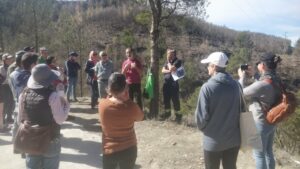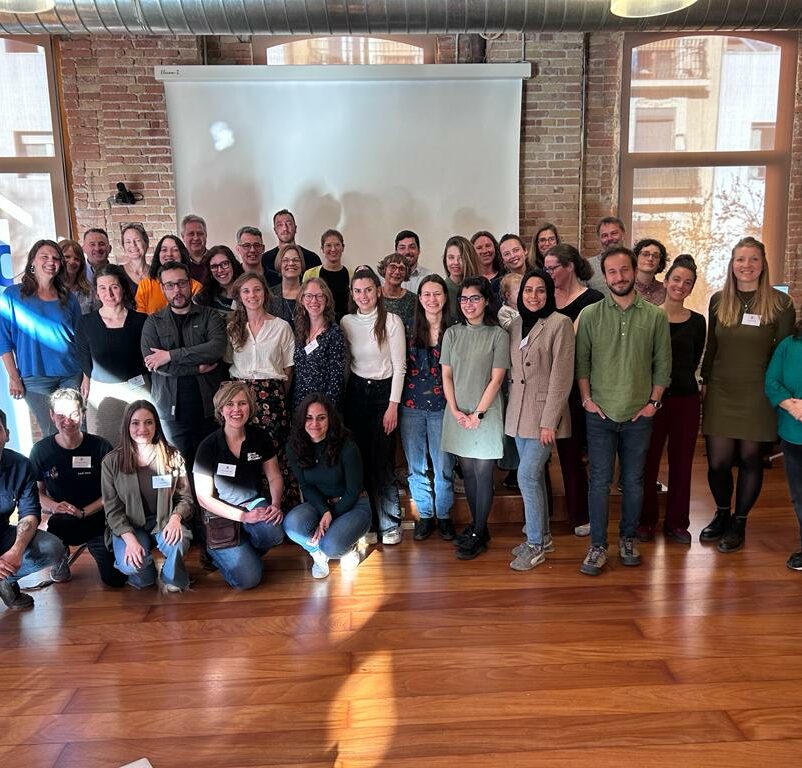27 researchers and practitioners presented their work on different aspects of Integrated Fire Management, including the doctoral research of 13 Early-Stage Researchers funded by the European project PyroLife.
A field trip was organized by the Catalan Fire and Rescue Service and the Pau Costa Foundation in collaboration with CTFC researchers.
The conference hosted wildfire researchers and practitioners from Europe, the US, and New Zealand to discuss the present and future of Integrated Fire Management.
PyroLife, a PhD training program on Integrated Fire Management funded by the Marie Skłodowska-Curie Actions, has brought forth the PyroLife 2023 Conference “The four axes of diversity of wildfire”, held in Barcelona from the 14th to the 16th of March. Organized by the Pau Costa Foundation, the Open University of Catalonia, and the Wageningen University & Research, and with the participation of researchers from the Forest Science and Technology Center of Catalonia (CTFC), the conference aims to know the novel results obtained by the PyroLife Early-Stage Researchers, to discuss the present and future of Integrated Fire Management, and to network.
 During the first day of the conference, participants joined a field trip, alongside the European project FIRE-RES, organized by the Catalan Fire and Rescue Service, and the Pau Costa Foundation in collaboration with the CTFC. Participants visited Pont de Vilomara, an area burnt in July of 2022, and a strategic area to fight wildfires located on the upper basin of the Llobregat river. At Pont de Vilomara, the Catalan Fire and Rescue Service members talked about the behavior of the wildfire and the complexity of the extinction efforts once the fire reached the urban-forest interphase. Together with CTFC researchers, they discussed the effects of wildfires on ecosystem services, focusing on the soil, and how low intensity burnt stands can help reduce the severity of future wildfires. During the visit to the Llobregat upper-basin strategic area, different options for integrated management were presented to create an area with low fuel availability that will allow emergency services to maneuver with security. On this stop, the effects of thinning and prescribed burns over fuel dynamics were analyzed.
During the first day of the conference, participants joined a field trip, alongside the European project FIRE-RES, organized by the Catalan Fire and Rescue Service, and the Pau Costa Foundation in collaboration with the CTFC. Participants visited Pont de Vilomara, an area burnt in July of 2022, and a strategic area to fight wildfires located on the upper basin of the Llobregat river. At Pont de Vilomara, the Catalan Fire and Rescue Service members talked about the behavior of the wildfire and the complexity of the extinction efforts once the fire reached the urban-forest interphase. Together with CTFC researchers, they discussed the effects of wildfires on ecosystem services, focusing on the soil, and how low intensity burnt stands can help reduce the severity of future wildfires. During the visit to the Llobregat upper-basin strategic area, different options for integrated management were presented to create an area with low fuel availability that will allow emergency services to maneuver with security. On this stop, the effects of thinning and prescribed burns over fuel dynamics were analyzed.
Integrated Fire Management is an approach to fire management that seeks to reduce the risks and maximize the benefits of fire through the integration of knowledge and expertise from multiple agents: scientists, practitioners, administration, landowners, local communities, firefighters, etc. The risk of extreme wildfires nowadays is increasing due to the lack of appropriate management, changes in land use, and climate change. Many experts globally believe that Integrated Fire Management is a long-term sustainable way to reduce the risk of extreme wildfires. For instance, one common practice is using prescribed fires in controlled conditions to reduce the excess of vegetation to avoid fires burning into uncontrollable large wildfires.
“PyroLife – training the next generation of Integrated Fire Management experts” is an Innovative Training Network composed of 26 partner organizations and funded under Horizon 2020 from the European Commission with € 3,946,980. It supports a group of Early-Stage Researchers from 10 European institutions to conduct their doctoral research mostly at their home institution and at two host organizations in other countries.
Last modified: 21 June 2023










